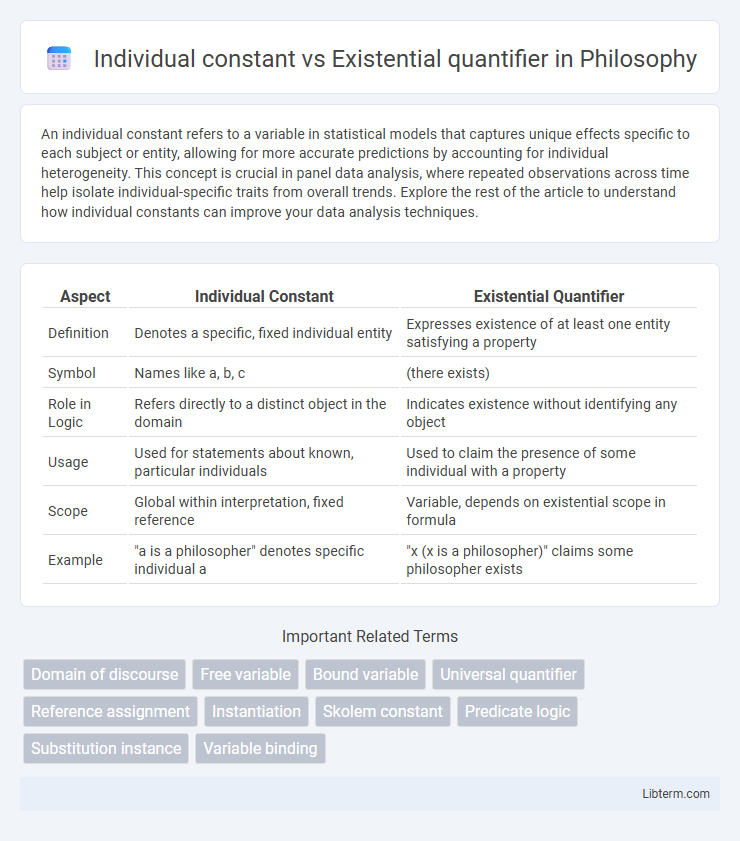An individual constant refers to a variable in statistical models that captures unique effects specific to each subject or entity, allowing for more accurate predictions by accounting for individual heterogeneity. This concept is crucial in panel data analysis, where repeated observations across time help isolate individual-specific traits from overall trends. Explore the rest of the article to understand how individual constants can improve your data analysis techniques.
Table of Comparison
| Aspect | Individual Constant | Existential Quantifier |
|---|---|---|
| Definition | Denotes a specific, fixed individual entity | Expresses existence of at least one entity satisfying a property |
| Symbol | Names like a, b, c | (there exists) |
| Role in Logic | Refers directly to a distinct object in the domain | Indicates existence without identifying any object |
| Usage | Used for statements about known, particular individuals | Used to claim the presence of some individual with a property |
| Scope | Global within interpretation, fixed reference | Variable, depends on existential scope in formula |
| Example | "a is a philosopher" denotes specific individual a | "x (x is a philosopher)" claims some philosopher exists |
Introduction to Logical Symbols
The individual constant in logical symbols represents a specific, fixed object within the domain of discourse, allowing precise identification in logical expressions. The existential quantifier, symbolized as , asserts that there is at least one element in the domain for which a given predicate holds true, emphasizing the existence of such an element without naming it. Mastery of these symbols is essential for constructing accurate formal statements in predicate logic.
Defining the Individual Constant
An individual constant in logic is a symbol that refers to a specific, fixed element within a domain, standing for exactly one object without ambiguity. Unlike existential quantifiers, which assert the existence of at least one element satisfying a property, individual constants denote a particular known object. Defining an individual constant ensures precise reference in logical expressions, enabling clear identification of entities in formal systems.
Understanding the Existential Quantifier
The existential quantifier () expresses that there is at least one element in a domain that satisfies a given property, contrasting with individual constants, which refer to specific elements. Understanding the existential quantifier involves recognizing its role in stating that some member of the domain meets the criteria without identifying which one. This quantifier is foundational in predicate logic, enabling generalizations about domain elements without explicit naming.
Syntax and Representation
The individual constant in logical syntax represents a specific, identifiable element within the domain of discourse, typically denoted by lowercase letters such as \(a\), \(b\), or \(c\). In contrast, the existential quantifier (\(\exists\)) introduces a variable and asserts the existence of at least one element in the domain that satisfies a given predicate, represented as \(\exists x \, P(x)\). While individual constants denote fixed entities, the existential quantifier binds variables, allowing for statements about unspecified but existing elements.
Semantic Roles in Logic
Individual constants represent specific, fixed entities within a domain, playing the semantic role of denoting particular objects or individuals. Existential quantifiers express the existence of at least one element in the domain satisfying a given property, assigning a role that asserts presence without identifying a specific entity. Together, they shape the semantic framework of logical expressions by distinguishing between referencing explicit objects and asserting the existence of objects with certain characteristics.
Expressing Particularity: Constant vs Quantifier
An individual constant refers to a specific, fixed entity in a logical system, enabling precise reference to a particular object. The existential quantifier, symbolized as , expresses the existence of at least one element in a domain that satisfies a given property, without specifying which one. While individual constants convey exact particularity, existential quantifiers capture the notion of some particularity implicitly, allowing for general statements about existence.
Examples in Formal Logic Statements
The individual constant in formal logic refers to a specific, fixed element within a domain, such as \(a\) representing a particular person, and is used in statements like \(P(a)\), meaning predicate \(P\) holds for that individual. The existential quantifier \(\exists\) expresses that there is at least one element in the domain for which the predicate is true, exemplified by \(\exists x P(x)\), indicating that some element \(x\) satisfies property \(P\). Comparing \(P(a)\) with \(\exists x P(x)\), the former denotes a statement about a known specific object, whereas the latter asserts a property about an unspecified member of the domain.
Impact on Logical Validity
The individual constant specifies a particular element in the domain, allowing direct reference that strengthens logical validity by eliminating ambiguity in arguments. Existential quantifiers assert the existence of at least one element satisfying a condition, introducing scope and variability that can complicate validity assessment when drawing universal conclusions. Understanding the distinctions between these elements is crucial for verifying whether logical statements maintain truth across all interpretations.
Applications in Mathematical Reasoning
Individual constants serve as fixed references to specific elements within a domain, enabling precise statements in proofs and logical derivations. Existential quantifiers express the existence of at least one element satisfying a given property, essential for formulating and verifying existence claims in mathematics. Together, they underpin formal systems such as predicate logic, facilitating rigorous argumentation in number theory, set theory, and automated theorem proving.
Summary: Key Differences and Uses
Individual constants refer to specific, fixed elements within a domain, representing particular objects or entities in logical expressions. Existential quantifiers express the existence of at least one element in a domain that satisfies a given property, without specifying which element. The key difference lies in specificity: individual constants identify exact objects, while existential quantifiers assert that such objects exist, making them essential in formal logic for defining precise versus generalized statements.
Individual constant Infographic

 libterm.com
libterm.com